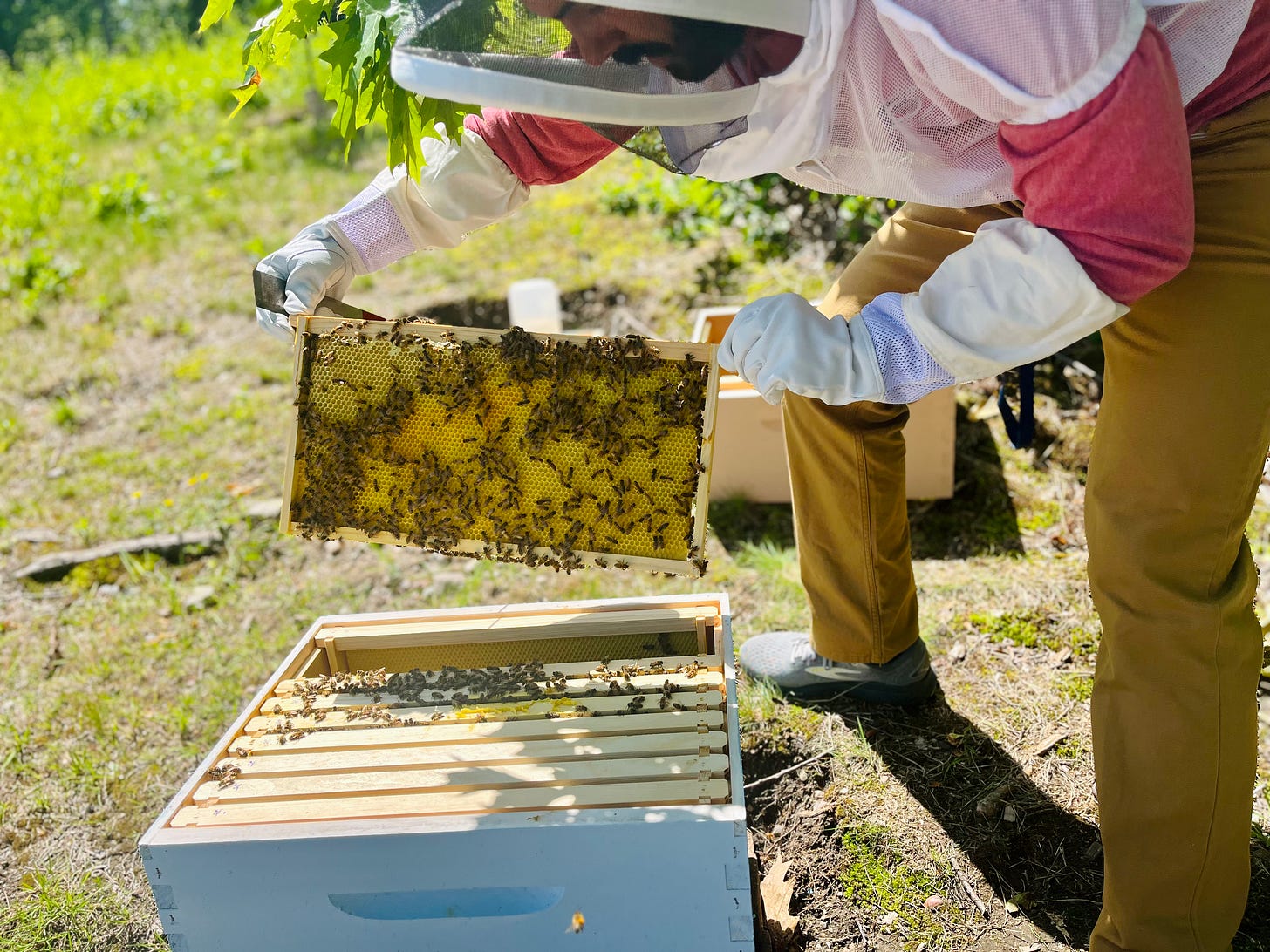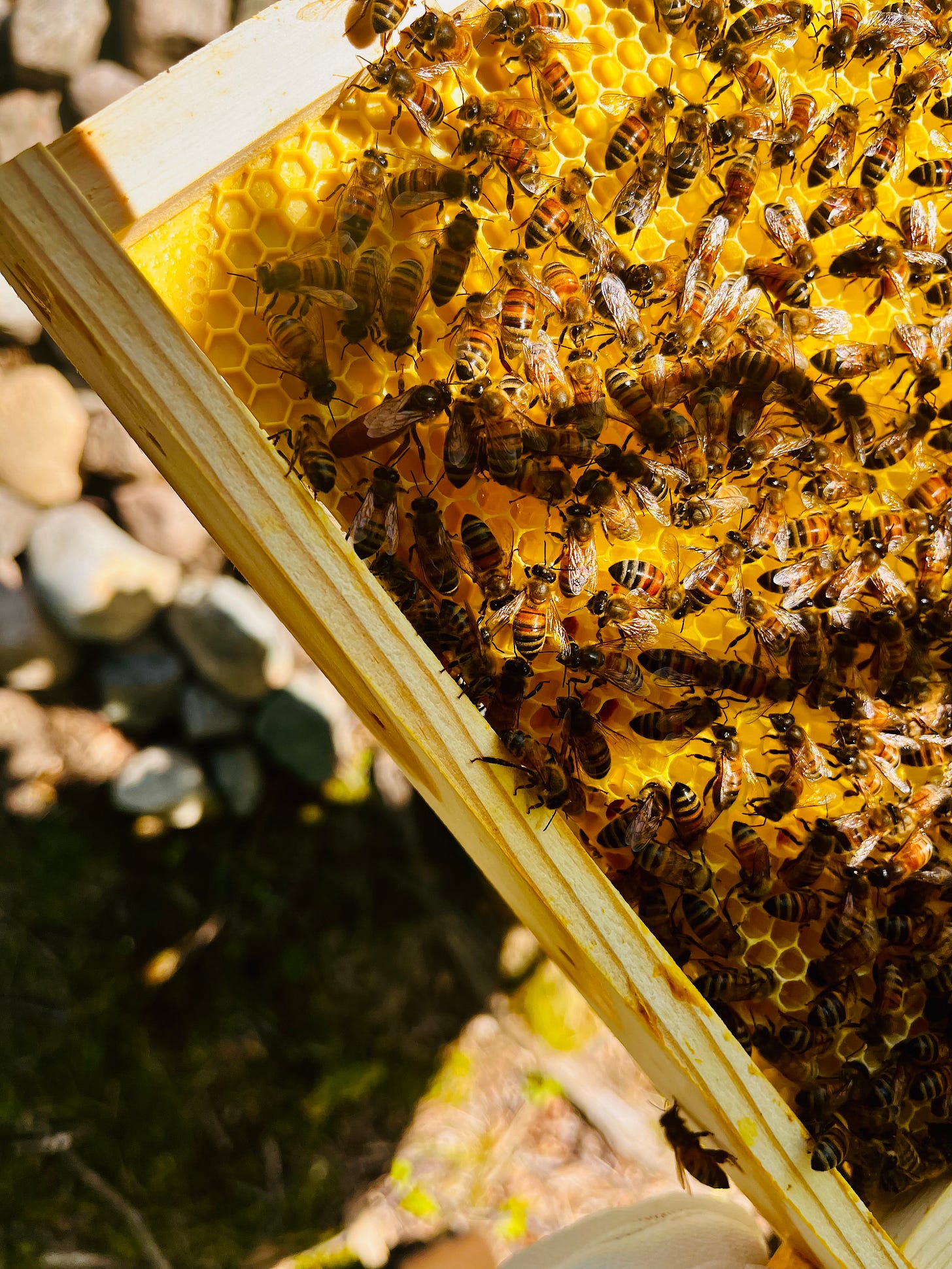Classical Roots is a free weekly newsletter. If you want to support the cause, the best way you can help us is to spread the word.
The poet Robert Frost is famous for his quip, “No surprise for the writer, no surprise for the reader.” By this, I think he means that if an author doesn’t enter the writing process with a certain self-forgetful openness, allowing whatever they’re writing to take an unexpected direction, even the most careful work will often yield flat and uninspired results. Frost was a meticulous craftsman—he was certainly not one to advocate for the artist turning his or her brain off—but he was also sensible to the mysteriousness and discovery that are possible for us when we allow an hour to take a surprising turn.
I was gifted just such an unexpected moment of inspiration a little more than a week ago, when my colleague Matt Offner invited me to step out into the bright June morning with him and open CCA’s new honeybee hive. Matt has been pursuing the craft of beekeeping for some years now, and the Classical Roots Program was delighted when he suggested sharing that wealth with the campus. After all, why sew endless native pollinating flowers in our orchard and not invite some bees along for the feast?
I’ll admit that, as we suited up and ignited the smoker with a whorl of pine straw that huffed a dry, pleasant, summer-day smell when Matt put the match to it, I suddenly realized that my feelings about bees are mixed. My neighbors on either side at home keep bees, and we’re surrounded by three active hives within fifty feet of our back porch at all times. I’ve always found the bees to be gentle, fascinating creatures—my youngest son will frequently hold them and even pet them with never a sting—but to sit in the presence of them is different than ransacking their house. As Matt squeezed the white plumes of smoke over the entrance to the hive and began to lift away the lid, I started to feel like my collar was a little tight, and could hear the thud of my heart in my ears.
But below that thud, I began to hear a different sound. The smoke, Matt told me, disrupts the transmission of the pheromone by which the bees signal danger to one another, and also encourages them to go to ground. Thus, as he began to lift the frames from the hive, one by one, the only noise the bees made was a low, almost subterranean hum that resonated in my chest. It was an awesome, primordial noise, as elemental and calming as waves against a shore, and I found my worry melting instant by instant. After that came the fascination of the bees in all their stages of life—we even saw one emerging from its egg chamber while others encouraged it along—from the collecting of orchard pollen to the thousand perfect hexagons glistening with honey. We saw the queen and her attendants. We watched the stolid bustling of the drones. And, though our ankles and wrists were often exposed, we were entirely unmolested as we worked.
It occurred to me that humans and honeybees have been partners in agriculture since before recorded history. Our visit to their hive, I realized, was less the ransacking of a house and more the meeting of old associates. Disagreements can happen, but there is also an absolute interdependence between our species that’s humbling and strangely comforting. At a level far below the intellect, lodged at the heart of instinct, I felt I belonged there, a representative of humanity in the long alliance of earthly fruitfulness.
If you enjoy what you’re reading here and want to support us, why not subscribe? It’s free to all and you’ll get access to our weekly posts, as well as a weekly subscriber-exclusive chat where we brag about our gardens and beg for advice. It’s the best way to support us.
Also: Tell me what you think! Your comments are part of what makes this program worth doing and this newsletter worth writing. If you have thoughts, advice, questions, or enthusiasm, let me know! Others are waiting to join the conversation.





That last paragraph was actually genius. Wow.
Thank you for a wonderful read!